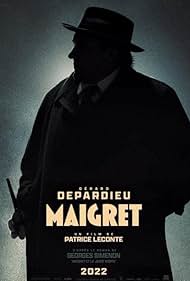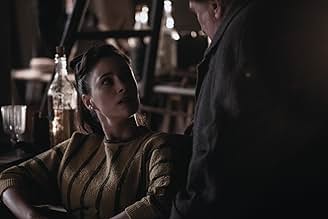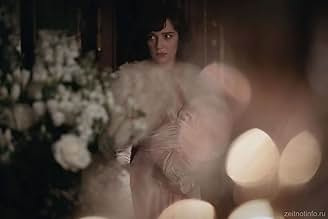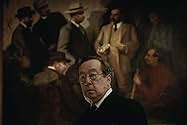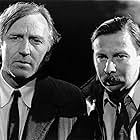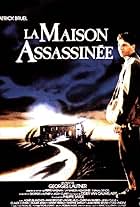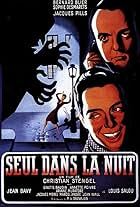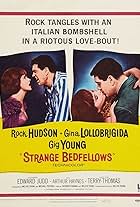Maigret
- 2022
- 1h 29m
IMDb RATING
5.9/10
3.3K
YOUR RATING
In Paris, a young girl is found dead in a Parisian square, wearing an evening dress. Commissioner Maigret will try to identify her and then understand what happened to the victim.In Paris, a young girl is found dead in a Parisian square, wearing an evening dress. Commissioner Maigret will try to identify her and then understand what happened to the victim.In Paris, a young girl is found dead in a Parisian square, wearing an evening dress. Commissioner Maigret will try to identify her and then understand what happened to the victim.
Hervé Pierre
- Docteur Paul
- (as Hervé Pierre de la Comédie Française)
- Director
- Writers
- All cast & crew
- Production, box office & more at IMDbPro
Storyline
Did you know
- TriviaDaniel Auteuil was attached to play Maigret in the movie.
- ConnectionsFeatured in Rembob'Ina: Maigret (2022)
Featured review
Gérard Depardieu takes up the pipe to play the indefatigable commissaire Maigret. He is such an obvious casting choice with his understated intelligence, gentle wit, and hulking physique that it's a wonder he hadn't played the part before. At age 73, he is quite obviously too old for the part. He spends most of the movie leaning or sitting down and the few times we see him walk he seems barely able to amble along. But this seems to be how director Patrice Leconte has reimagined the character anyway.
His Maigret is an old man, easily tired, contemplating his mortality. He is introduced while in the middle of a doctor's appointment. He's in fine physical health we're told but the weight of the world seems to be on his shoulders. No, this Maigret is not alright. There's something severely wrong with him, a kind of emptiness eating him from the inside. He's dying and he's aware of it.
Another obvious fit for a Maigret movie is director/writer Patrice Leconte who had previously made the superb Simenon adaptation "Monsieur Hire". His direction here is curiously frigid, styleless and distant. This is not an easy movie to watch. It's so weighed down with sorrow that it becomes downright oppressive. It plays out in vast open spaces cluttered with garbage - long discarded, broken things, once useful now forgotten and in the way. His Paris resembles a post-apocalyptic wasteland which, like the one in Richard Lester's "Bed Sitting Room", bears certain signs that it was once inhabited by a civilization.
A clue as to Leconte's artistic intentions is hidden in a sombre and impactful scene in which Maigret interviews an elderly Jewish man (André Wilms) looking for a daughter he'll never find. He sits in his office surrounded by antique chairs stacked on antique desks and wrapped in cobwebs and dust. "When you lose your child you lose everything," he says, "There's nothing left. Only the night."
The plot follows Maigret as he investigates the death of a young woman found stabbed and discarded on the street like a piece of trash. He doesn't know her name or anything about her but slowly, by following the smallest clues, he pieces together her entire personality. Before he even identifies her he can say things like "she would never do that" with absolute certainty.
He finds this out by talking to various people, some of whom knew her, some of whom didn't, and some of whom are lying they didn't. These people include an actress who isn't an actress living her life on sets opening fake doors, a rich and arrogant man who lives with his mother and relies entirely on her platitudes, a judge obsessed with his pet fish, and a pharmacist who issues drugs based on her customer's faces.
The performances are excellent especially that of Jade Labeste as Betty, a poor girl Maigret encounters on the streets and whom he is determined not to allow to suffer the same fate as the girl whose death he is investigating. Labeste's charismatic, world-weary performance is the standout of the film and has a certain classical quality that reminded me of the French cinema of the 1960s. I can't wait for her to lead a film all on her own.
These small characters are the most important and their plights and the world they inhabit together are at the centre of the film. In that sense, this is one of the most accurate Simenon adaptations. What Leconte's film doesn't manage, however, is the delicate balance between character study and thriller.
Simenon knew that his psychological treatise needed a solid motor in the form of a mystery plot to keep the readers interested and the story on track. Leconte, in building up the characters, far too often lets the plot fall by the wayside. The result is a film which is intriguing and atmospheric but frequently aimless, uneven and taxing on its audience's patience.
He has little interest in the whodunnit aspect of the story which results in "Maigret" lacking a solid framework and, more importantly, a sense of narrative propulsion. Consequently, the pacing suffers, feeling alternatively too slow or too fast depending on Leconte's interest in the given scene. Exposition is quickly dealt with and the plot frequently gets muddy.
In "Maigret", I admired the ambition more than the result and the whole is less than the sum of its parts. The production design, the idea, and the performances are all superb but the film collapses under its own weight. It's a dour, depressing, hopeless sit without a strong narrative to buoy its heady artistic intentions.
His Maigret is an old man, easily tired, contemplating his mortality. He is introduced while in the middle of a doctor's appointment. He's in fine physical health we're told but the weight of the world seems to be on his shoulders. No, this Maigret is not alright. There's something severely wrong with him, a kind of emptiness eating him from the inside. He's dying and he's aware of it.
Another obvious fit for a Maigret movie is director/writer Patrice Leconte who had previously made the superb Simenon adaptation "Monsieur Hire". His direction here is curiously frigid, styleless and distant. This is not an easy movie to watch. It's so weighed down with sorrow that it becomes downright oppressive. It plays out in vast open spaces cluttered with garbage - long discarded, broken things, once useful now forgotten and in the way. His Paris resembles a post-apocalyptic wasteland which, like the one in Richard Lester's "Bed Sitting Room", bears certain signs that it was once inhabited by a civilization.
A clue as to Leconte's artistic intentions is hidden in a sombre and impactful scene in which Maigret interviews an elderly Jewish man (André Wilms) looking for a daughter he'll never find. He sits in his office surrounded by antique chairs stacked on antique desks and wrapped in cobwebs and dust. "When you lose your child you lose everything," he says, "There's nothing left. Only the night."
The plot follows Maigret as he investigates the death of a young woman found stabbed and discarded on the street like a piece of trash. He doesn't know her name or anything about her but slowly, by following the smallest clues, he pieces together her entire personality. Before he even identifies her he can say things like "she would never do that" with absolute certainty.
He finds this out by talking to various people, some of whom knew her, some of whom didn't, and some of whom are lying they didn't. These people include an actress who isn't an actress living her life on sets opening fake doors, a rich and arrogant man who lives with his mother and relies entirely on her platitudes, a judge obsessed with his pet fish, and a pharmacist who issues drugs based on her customer's faces.
The performances are excellent especially that of Jade Labeste as Betty, a poor girl Maigret encounters on the streets and whom he is determined not to allow to suffer the same fate as the girl whose death he is investigating. Labeste's charismatic, world-weary performance is the standout of the film and has a certain classical quality that reminded me of the French cinema of the 1960s. I can't wait for her to lead a film all on her own.
These small characters are the most important and their plights and the world they inhabit together are at the centre of the film. In that sense, this is one of the most accurate Simenon adaptations. What Leconte's film doesn't manage, however, is the delicate balance between character study and thriller.
Simenon knew that his psychological treatise needed a solid motor in the form of a mystery plot to keep the readers interested and the story on track. Leconte, in building up the characters, far too often lets the plot fall by the wayside. The result is a film which is intriguing and atmospheric but frequently aimless, uneven and taxing on its audience's patience.
He has little interest in the whodunnit aspect of the story which results in "Maigret" lacking a solid framework and, more importantly, a sense of narrative propulsion. Consequently, the pacing suffers, feeling alternatively too slow or too fast depending on Leconte's interest in the given scene. Exposition is quickly dealt with and the plot frequently gets muddy.
In "Maigret", I admired the ambition more than the result and the whole is less than the sum of its parts. The production design, the idea, and the performances are all superb but the film collapses under its own weight. It's a dour, depressing, hopeless sit without a strong narrative to buoy its heady artistic intentions.
- How long is Maigret?Powered by Alexa
Details
- Release date
- Countries of origin
- Official site
- Languages
- Also known as
- Мегрэ и таинственная девушка
- Filming locations
- Le Vésinet, Yvelines, France(Clermont-Valois' manor, 52 Av. G. Clemenceau)
- Production companies
- See more company credits at IMDbPro
Box office
- Gross worldwide
- $5,942,128
- Runtime1 hour 29 minutes
- Color
- Aspect ratio
- 2.35 : 1
Contribute to this page
Suggest an edit or add missing content

